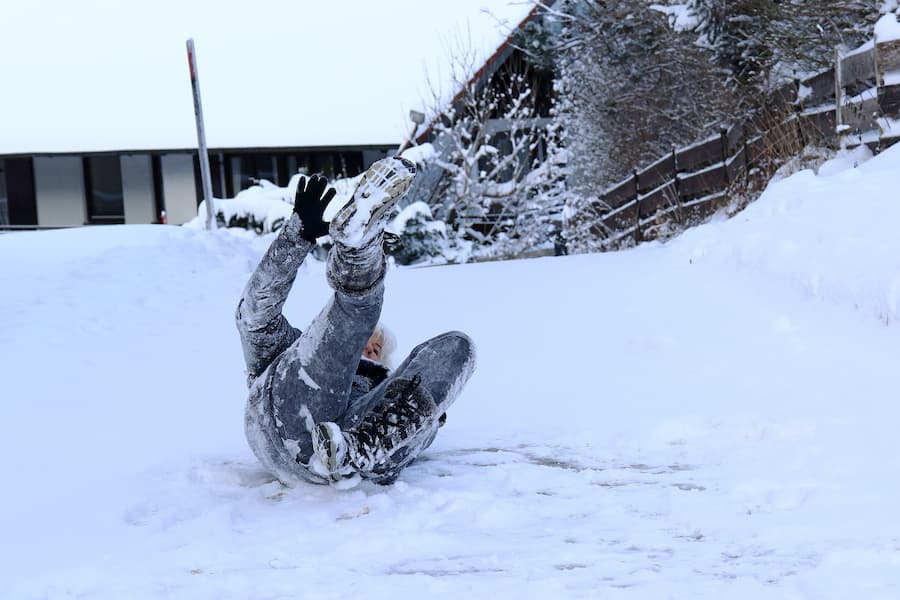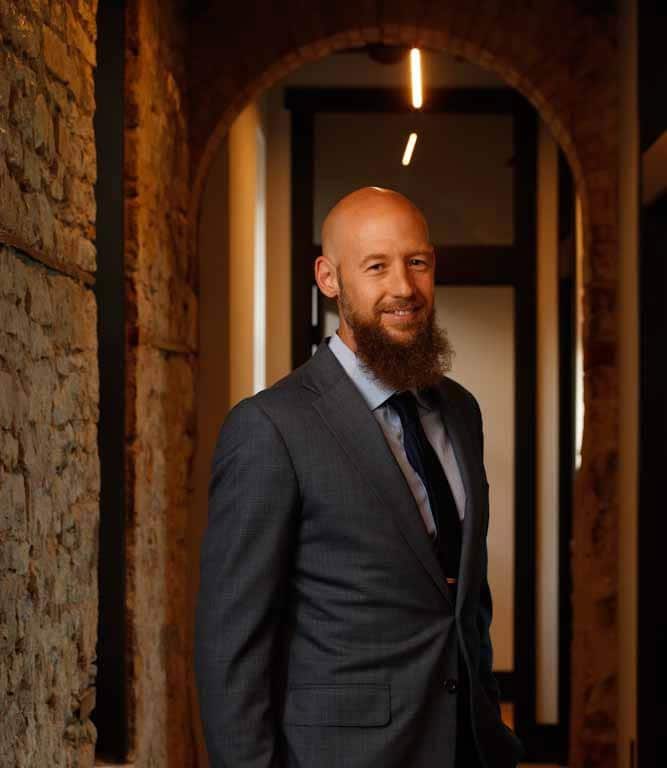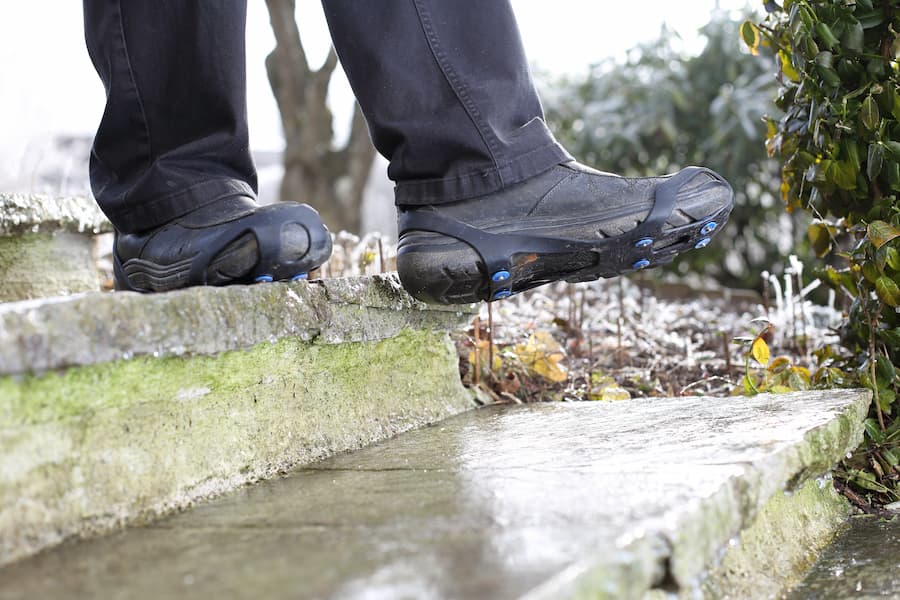How to Know if You Have a Case
Some states have specific laws regarding cleaning snow and ice, while others rely on individual cities or towns for relevant ordinances. In most cases, you must file a reasonable claim after a slip and fall in winter conditions.
If it snows and you slip and fall, you may or may not have a case depending on the circumstances. For instance, if the commercial building owner or manager should have cleaned the walkways if a walkway iced over several hours after the snow stopped, you may have a case.
Because negligence rules, laws, and ordinances are often complex, retain a slip and fall lawyer or a premises liability attorney to review the law or ordinance regarding clearing snow and ice.
Proving Negligence
To win a slip and fall case, you must prove the property owner was negligent.
Negligence has four elements:
- The property owner (or manager or person in charge of keeping the property safe) has a duty of care to keep the property safe. If the property is open to the public on a winter day, the duty of care includes keeping walkways and parking lots free of ice and snow—within reason.
- The property owner breached the duty of care. Depending on the laws and ordinances, the court might not find the property owner negligent if it is actively snowing when you fall. However, if the ordinance states that walkways must be cleared within four hours after it stops snowing, and you slip and fall five hours after it stops snowing, a court might find that the property owner breached the duty of care.
- You suffered injuries because the property owner breached the duty of care.
- Your injuries created a financial burden.
Your slip and fall lawyer will help determine whether you have a case against a property owner based on laws and ordinances for clearing ice. Your attorney will also look at other factors that might affect your claim.
Injuries You Might Suffer if You Slip and Fall

You could sustain many injuries, from minor cuts, scrapes, bruises, and bumps to catastrophic injuries or even death after a slip and fall accident.
However, the most common injuries related to slip and fall accidents include:
- Strains and sprains to the ankles and wrists
- Knee injuries
- Back and spinal cord injuries
- Traumatic brain injuries
- Head, neck, and shoulder injuries
- Face and eye injuries
- Tailbone injuries
Any of these injuries could take weeks or months to heal. If you suffer spinal cord injuries and traumatic brain injuries, you could be permanently disabled. While insurance companies have their own definitions for long-term or permanent injuries, the Social Security Administration defines them as lasting for more than 12 months or resulting in death.
Additionally, minor injuries could turn into more significant injuries. For example, if you cut your face when you fall on ice, the cut could become infected and cause additional expense and pain. A negligent defendant could be responsible for any secondary injuries such as infections resulting from the cut.
Other injuries you could sustain if you slip and fall in winter conditions include road rash, pulled and torn muscles, soft tissue injuries, simple and compound fractures, and internal injuries.
Commercial Businesses and Business Owners Who Might Share Liability for a Slip and Fall
In most cases, you bring a slip and fall claim against a property owner. However, if the property is commercial, you sue the person responsible for the care, custody, and control of the building.
Those who might share liability for your injuries if you slip and fall include:
- Employers
- Landlords
- A third-party maintenance company
- Schools
- Large companies
- Retail establishments
- Small businesses
- Hotels and motels
- Local franchises and other business properties
- Restaurants and bars
- Casinos
- Nursing homes
- Hospitals and doctors’ offices
- Airports
Regardless of the type of business, you must prove that the property owner was negligent in their duties to clear the snow and ice from walkways and parking lots.
How to File a Slip and Fall Claim
Slip and fall accidents are often complex, especially if you suffer catastrophic injuries. A slip and fall attorney can help you recover the compensation you deserve. However, don’t retain just any personal injury attorney—you need a firm with experience in premises liability—specifically, trip or slip and fall accidents.
If you have catastrophic injuries, you should also ensure the firm has experience with significant cases involving future medical expenses and other damages.
Statute of Limitations and Other Timing
You have a certain amount of time to file a slip and fall case. Different states have different time frames. Immediately following your accident, contact a premises liability attorney to discuss your case, even if you are unsure if you have a valid claim. Allow a slip and fall attorney experienced in winter condition accidents to help you determine your options.
If you wait too long, insurance companies could use this delay against you. More importantly, you and any witnesses are more likely to forget facts that could make or break your case if you wait too long.
Furthermore, if you seek medical attention immediately, it links the time of day to the incident. If your city has a time limit on clearing snow and ice, for example, four hours after snow stops, you will have a record linking your fall to the time of day. You should also report the incident to the property owner, as this step also helps develop a timeline.
Why You Should Retain a Premises Liability Attorney
A slip and fall lawyer can help you manage the insurance companies. Insurance companies are in business to make money and do not prioritize your interests—even your own insurance company. Their primary goal is to generate profit.
Insurance companies, regardless of type, will likely attempt to deny or limit your claim. Instead of wasting energy arguing with the insurance company to recover the compensation you deserve, allow your attorney to manage the negotiations. You lawyer will represent your interests and indicate to the insurance company that you are serious about your claim.
Additionally, the insurance company is usually less likely to use its tricks on an attorney.
Insurance companies may maneuver to justify a case denial or a low settlement amount, using tactics including:
- When you first call to report the incident, the insurance company could ask you questions about the fall. It could twist what you say in an attempt to deny your claim or offer you a lower amount. If you call the insurance company, only give your name, contact information, the date and location of the incident, and your slip and fall lawyer’s name and contact information.
- The insurance company admits its client is at fault but then tells you that the most it can pay is some meager amount that might not cover your medical expenses.
- The insurance company acts as if it cares about you to convince you that its settlement is fair and reasonable.
- The insurance company delays the process. They hope you will give up on the claim if it delays long enough.
- They “encourage” you not to retain an attorney.
- The insurance company requests all of your medical records. They are not entitled to all your records, only those related to the slip and fall incident. They may try to use previous medical records to deny compensating for your current injuries.
- Insurance companies may also try to claim that certain medical treatments were not necessary so they won’t have to pay for them.
When you retain a slip and fall attorney to handle your case, you don’t have to worry about insurance companies playing their tricks on you. Instead, you can concentrate on recovering from your injuries.
What a Slip and Fall Lawyer Can Do to Help
In addition to negotiating with the insurance company, a slip and fall lawyer can also help you get the medical care you need. They have the resources to investigate the case and hire expert witnesses to help prove your medical issues are from the fall.
Recovering Damages After a Slip and Fall Accident

The damages you might recover include much more than medical expenses. You could receive compensatory damages in the form of economic damages and non-economic damages.
Economic Damages
Sometimes referred to as special damages, economic damages have a monetary value. Those who suffer injuries in a slip and fall accident with a viable claim often recover economic damages, including:
Medical Expenses
A slip and fall accident victim might have minor or major medical expenses, depending on how they fell.
Medical expenses might include:
- Doctor’s appointments
- Surgeries and follow-up appointments
- Prescriptions and prescribed over-the-counter medications
- Physical therapy
- Ambulatory aids
- Cognitive therapy
- Occupational therapy
- Psychological therapy
- Hand controls for vehicles
- Home updates, including but not limited to handrails, grab bars, widened doorways, and wheelchair ramps
Wages
When you slip and fall, you could injure yourself enough to miss work. You could recover lost wages for those days that you miss.
Additionally, if your injuries are catastrophic and cause long-term or permanent disabilities, you could recover loss of future earning capacity. Even if you are able to work, but only part-time, or if your injuries force you to take a job that pays less than your previous job, you could still recover for loss of partial earning capacity.
If loss of earning capacity is part of a fair and reasonable settlement, you could recover the compensation from the time of the accident through the time you would retire.
Death-Related Expenses
If you lost a loved one in a slip and fall accident, you could recover death-related expenses, including:
- Funeral and burial expenses
- Cremation expenses
- Certain probate court expenses
- Probate attorney’s fees and costs
Non-Economic Damages

Sometimes referred to as general damages, non-economic damages do not have a clear monetary value. In most cases, only those who lost a loved one or those whose injuries caused long-term or permanent disabilities recover non-economic damages.
Non-economic damages include:
- Pain and suffering, including emotional distress
- Loss of quality of life if you have to make life-long changes, such as using ambulatory aids or taking prescription drugs
- Loss of companionship if you can no longer enjoy time with your family or participate in family activities and events
- Loss of consortium if you can no longer enjoy a physical relationship with your spouse.
- Loss of use of a body part, such as a foot or an arm
- Loss of use of a bodily function, such as your eyesight or bladder control
- Inconvenience if you have to hire someone to do the chores you usually do, such as lawn maintenance, grocery shopping, home repair and maintenance, and house cleaning
- Amputation of a digit or limb
- Excessive scarring and/or disfigurement
If you suffered injuries or lost a loved one because of a winter slip and fall accident, contact a slip and fall attorney with experience handling cases involving winter conditions. Reach out to a personal injury lawyer.
